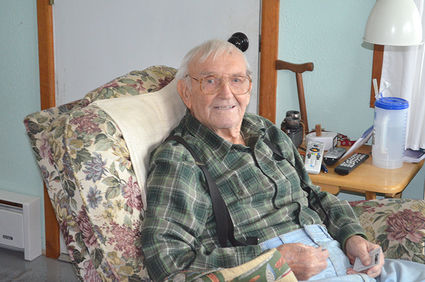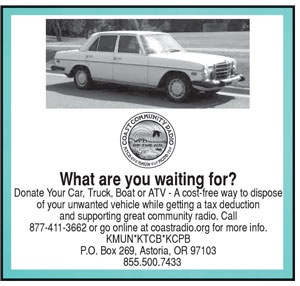Island native recalls his past
January 15, 2015
Art Vik, who will be 100 years old in September, lives in a pleasant little one room house on the southeast side of Puget Island with a plump little Dachshund named Pepe. Large picture windows open up to the Columbia where he can watch the ships pass and try to divine the mysterious patterns in a flock of scaups.
"I built this as a garage but I hardly ever used it," Vik said of his cosy home. "I moved it back to the barn to keep my tractors in. I didn't need it so I moved it out here and put it on a dock as my net house. Finally I moved it back onto land and finished it. My daughter put in the cabinets."
He added a porch and friends gathered there for pie, ice cream, coffee and conversation. Most of those friends are gone, but it's still busy on the porch. There is a bird feeder hanging from an eave and several finches flurry to and fro. Vik feeds them daily.
"They watch for me," he said. "When the feeder is empty they perch in the trees and brush nearby, waiting for me to come out."
Art was born three houses down from where he lives now. He was the sixth and final child born to two Norwegian immigrants, their only child to be born on the Island.
"My folks came here in about 1912-1913," Vik said. His father came first, leaving Norway to join his sister in Minnesota in 1908. He worked for two years to bring his wife and four kids to the U.S.
"My mother came over on the Empress of Ireland with four kids," Vik said. "She arrived in Canada and cruised up the St. Lawrence River to Quebec. She took a train across Canada to a place just north of Minnesota and had to catch another train south to Minnesota. She missed the train. She couldn't speak a word of English and she just sat there in the depot and cried. Finally a fellow came along and asked her why she was crying. When she told him, he suggested getting in the caboose of a freight train that was headed the same way and off they went.
"When the trains started going, the brakeman came along and thought they were bums. He was going to kick them off but she showed him her ticket and he calmed down."
The family lived in Minnesota for a time and had another boy before moving to Puget Island to join an uncle.
When Vik was young, the only way off the island was by boat. The bridge from Cathlamet to Puget Island wasn't built until 1939, four years after he graduated from high school.
"There was a grocery store about a half mile from here at a place called Pancake Point," he said. "This was before refrigeration so they mostly got in dry goods. Then they added hardware. They had a dock out by the river and a boat would come from Portland to deliver goods before it headed to Cathlamet and down as far as Ilwaco."
He went to a one room schoolhouse with eight grades on the south side of the Island.
"I never got into any mischief," he grinned. "Okay. I liked to play little pranks on kids. I still do, to some extent. Not that I'd hurt anybody."
One time he and a couple of his friends were making a bridge with wet sand when a couple kids came by and jumped on all their hard work, destroying it. A fight broke out and someone ended up with a split lip and a trip to Westport for stitches.
There was a woman on the Island who liked to spread good news, but she liked bad news even better. His parents found out what had happened and his teacher made Vik and one of his friends go look for a good switch. Vik got paddled but he didn't throw that punch.
Around fourth grade he moved over to the larger central school on School House Road.
There were so many kids in his eighth grade class that his teacher gave them all state exams for every subject. If a student passed the test in a subject, the student didn't have to take the subject for the rest of the year. Four of her students passed every test. Vik was one.
"That was a mistake," he laughed.
The four took advantage of their free time, skating on frozen sloughs, doing what kids do. Still, with all that free time, he had to do some work. Vik would help his dad who was fishing by taking care of their cows, cleaning the barn, haying when the season came around.
In 1930, when Vik was 14 years old, the Columbia River froze over. The river was frozen solid on the north side of the island, according to Vik, but because of ship traffic on the south side, the river would open enough to let the ships go by.
"My two older brothers and another fellow took the boat and went over to Westport to get the mail," he said. "That's where the post office was. They were going through the ice floes. When they came back the ice was jammed on this side and they couldn't get through. They left the boat locked in the ice and walked ashore with the mail.
"There was a sick girl who needed a doctor," he remembered. "And there was a pilot by the name of Tex Rankin who put skis on his plane and flew a doctor down here."
The next summer Rankin brought two planes down, and the people on the Island had a big picnic with him. The generous pilot even took passengers up in his plane.
"That was in the summer of 30," Vik said. "I was just starting high school. Those were old, gone days."
Vik remembers the Great Depression.
"I never had any money, but we always had food on the table. One time I asked my dad if I could go fishing. There were tons of fish but no one was fishing. There wasn't a price for them. I caught 80 that I could sell, and the fish buyer bought them, three cents each. I made $2.40 that day."
After graduating in 1934, Vik went to Portland to attend a trade school. He studied diesel electric and automotive and he met the woman who would become his first wife, Margaret. Her father owned a shoe shop, and Vik worked there during the winter months, fishing in the summer.
Vik bought 25 acres on the Island a couple years out of high school. It was all timber, and he and his brother spent a lot of time clearing the land. The two had a steam donkey, and they piled up the trees and burned them. Later they sold cottonwood and spruce for pulp. He was able to use his new trade now and again, but with the Depression it was hard to find work.
A couple years later, the world was at war. Vik signed up for the draft and almost joined the Coast Guard. He ended up on a tug with the Army Corps of Engineers instead.
"It used to be a survey boat," Vik said. "It was 125 feet and it was almost like a yacht. We were towing along the coast, dodging submarines. Then we went to Alaska, out at the Aleutians, at the landing of Adak and so forth."
One night his vessel joined a convoy of destroyers and a cruiser headed out to Adak. The tug was towing a barge with radar equipment. There were soldiers on the tug with machine guns and depth charges. Another one of the tugs had engine trouble, and Vik's tug was called back to assist. Because lights were not used on the night mission, when the tug tried to return to the convoy, their former companions got nervous, thinking they were the Japanese.
"It got a little scary," Vik said, "but we finally got them straightened out."
Eventually he returned to Portland and continued to work for the war effort, building barges.
He and Margaret got married and had two boys and a girl, Marvin, Philip and Libby. His oldest boy showed an interest in farming, so Vik bought some more land, some cows and got busy learning how to run a dairy.
"There were organizations that we belonged to," Vik said. "I was president of the Southwest Milk Producers for 25 years, so I got to know a lot about milk and how it was handled."
He was also a diking commissioner for 25 years, including the year that the Island flooded, 1948.
"Vanport went out first, and there was loss of life," Vik said. "We got notifications to evacuate here. Everybody left the Island. I was down in Skamokawa with some people, with my cows, which had been hauled down here after the dike broke.
"We had a lot of snow that winter," he continued. "The Snake and the Columbia peaked at the same time. Usually the Snake would crest first and we'd get that water, but this time we got it all at once."
Later when Margaret died from cancer, he married Marian Healy, who had lost her husband to the disease as well. Vik also traveled to Norway four times to spend time with his extended family.
These days he spends time with his kids and grandkids or the few friends that like to reminisce about the old, gone days. Sometimes it's just Pepe the dog and the birds. He's moving at a comfortable pace.
"They say the Viks are very relaxed people," he said with a smile.















Reader Comments(4)
Traver writes:
I can sit and listen to my grandpa for hours. I love hearing all of his stories and he has many. He knows all of the history about Puget Island, Cathlamet and everyone that lives here. Love him!!
01/19/2015, 2:21 pm
motorwinder writes:
Thanks for the great article and history. I wonder if the trade school this gentleman attended was the L.L. Adcox school where my Dad learned diesel mechanics in the early forties?
01/16/2015, 1:50 pm
jvik92 writes:
I love you grandpa and I'm so glad people get to appreciate your story as much as we all have. I can't wait to come home and see you. Love, Jeff
01/15/2015, 4:41 pm
Bisondalen writes:
Lovely article of local historic value. Thank you for honoring the life story of this wonderful gentleman (and our relative).
01/15/2015, 1:20 pm